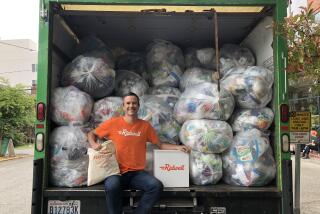Recyclers Seeking Ways to Rewind the Useful Life of Videotapes : Cassettes containing promotional or outdated material can be reused or fixed up for resale.
- Share via
Last week I realized I had a videocassette problem. It wasn’t that I was addicted to viewing them. Quite the contrary; they were piling up and I wasn’t viewing them at all.
Short ones. Promo tapes that are beginning to come in the mail in this post-literate era. I look at them once and put them aside. I mean, what do you do with a 17-minute opus called “Back From Exhaustion,” or the nine-minute “All New Second Edition of the One-Computer Classroom and More!”
I can’t just throw them out and have them cluttering up our county’s landfill. Even though the cassette itself is standard size, the tapes in them aren’t long enough to use for recording over when I want to tape my favorite show. So they gather dust.
I’ll bet this is happening to many of you too. Nowadays, if you’re a stockholder you may be getting cassettes in the mail instead of annual reports. Or perhaps you are on some other mailing list and are getting product pitches related to your line of work. Appliance companies put them in the washer instead of an operating manual.
Americans are annually bombarded with 100 million such tapes, according to Tape/Disc Business, a trade magazine. That’s a figure to rival blank-tape sales for home use, and it exceeds the number of kiddie videos sold last year.
All this stuff has to end up somewhere because we won’t be holding onto these tapes forever. So what should we do if we want to be environmentally correct?
Bob Finlayson to the rescue. The Thousand Oaks resident, who is also official spokesman for the Video Software Dealers Assn., a nationwide trade group for video store operators, gave me a conscience-soothing solution.
Recycle. Obvious, of course. But he told me how and where.
His organization, which recently moved from New Jersey, has discovered a nonprofit organization that accepts unwanted videocassettes and fixes them up for reintroduction into the marketplace.
In a few months, many of Finlayson’s member stores nationwide will be involved in a program to collect donated cassettes and ship them to the Missouri headquarters of Alternative Community Training Inc., an employment program for people with severe disabilities. Meanwhile, readers of this column may call that group independently.
Already, video stores have a problem with unwanted tape. They get previews and promos of coming attractions--and also have stuff piling up unsold from previous seasons. Video stores rent tapes out while they are popular and then sell them as “previously viewed” when rental action slows. Finlayson told me an unwanted tape story involving a hundred copies of “How To Prepare Your 1984 Federal Taxes.”
He also put me in touch with Ventura video store operator Jim Salzer, who for years has held national elected office in the Video Software Dealers Assn. and now is launching a special program in our county involving recycled tape. Salzer, owner of Salzer’s Video and Games, plans to use these cassettes to provide a valuable service to parents.
Saturday, he will, at no charge, make a “Kid Video I. D.” of your child. The video is as useful as a good still photo or fingerprint set for police in case a child disappears.
“I got the idea to do this when I realized I had 2,000 recyclable cassettes piled up in storage,” Salzer said.
If there is much demand for the Kid Video I. D., Salzer may begin asking customers to donate their own unused cassettes, just as he now asks them to bring back their plastic bags--which he flattens out and reuses at the store. “I’m a notorious recycler,” he confessed.
Videocassette recycling programs are starting up all over the country. In Maine, a high-tech firm called Global Zero has since January made five million cassettes out of reclaimed plastic--including Pampers. The new cassette housings themselves can be ground up and remolded because they are made of one kind of plastic, unlike the current widely used models that have four incompatible plastics.
Ninety percent of videocassette housings are made overseas, by the way. Only Technicolor in Newbury Park, Scotch in Minnesota and the firm in Maine manufacture in the U. S. The tape inside the cassette is also mostly imported, with only Scotch and Ampex actually making the stuff in this country.
This is an interesting issue for recyclers--of videotape or anything else--to wrestle with. A Hollywood firm, Studio Film and Tape, which recycles used videotape and cassettes from the studios, has developed a huge business in what the firm calls “Eco-Tape.”
Widely used in the electronic media industry, these “green” cassettes are even available to the public. Any Eco-Tape you buy might have a housing from Newbury Park and tape from Korea.
It doesn’t matter whether the materials originate here or abroad, just as long as the jobs that come out of making new product out of old product are here in America.
Just don’t throw it away when you’re through using it. Take it to your neighborhood video store for recycling.
* FYI
USED VIDEOTAPES of any kind are being accepted for recycling by Alternative Community Training Inc.--a nonprofit organization. Call (800) 359-4608.
SALZER’S VIDEO begins making--for free--a “Kid Video I. D.” for local families this Saturday in Ventura. Call 656-5785.
FOR INFORMATION on low-cost recycled “Eco-Tape” blank videocassettes, call (800) 444-9330. For information on the Video Software Dealer’s Assn. recycling program, call (818) 889-7148.






